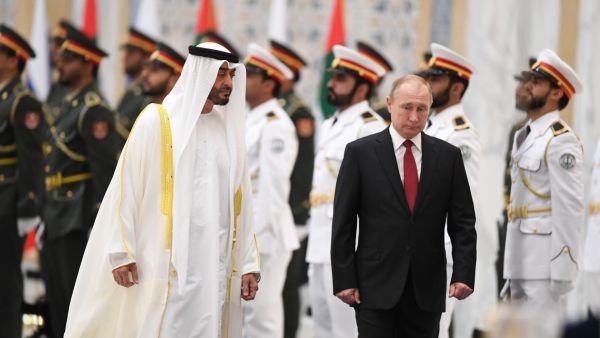ALBAWABA - The simultaneous visits of Saudi Crown Prince Mohammed Bin Salman to Paris and UAE President Mohammed Bin Zayed to Moscow took place during a period of strained Gulf-US relations.
These visits occurred amidst specific challenges, such as U.S. pressure on Gulf leaders regarding oil production reduction and various security concerns. These concerns encompassed issues like Saudi-Israeli normalization and the potential reestablishment of diplomatic relations between Saudi Arabia and Iran.
During their meeting last Friday evening, French President, Macron and the Saudi Crown Prince Mohammed emphasized their mutual dedication to ensuring security and stability in the Near and Middle East. They reiterated their shared objective of fostering a lasting reduction in tensions and expressed their intention to further enhance and strengthen the partnership between their respective countries. The two leaders also jointly urged for a swift resolution to the ongoing political void in Lebanon's institutions.
The two leaders convened in Paris, where it was anticipated that President Macron would seek the support of the Saudi Crown Prince in the efforts to facilitate the appointment of a new president for Lebanon.
However, on the same day that Mohammed Bin Salman (MBS) met French President Macron in Paris, UAE President Mohammed Bin Zayed had a meeting with Russian President Vladimir Putin in Moscow. During his visit, Bin Zayed expressed his desire to enhance UAE's ties with Russia, even in the face of Western sanctions against Moscow.
This growing inclination of Gulf leaders towards Russia and China, as well as their expanding partnerships, signifies a strategic shift in the relationship between the region's dynastic leaders and the Western superpowers, particularly the USA and Britain, as they increasingly align themselves with Eastern allies.
Additionally, these developments occur at a time when there is a noticeable and increasing divergence between the UAE and KSA on various significant matters. Particularly, there is a substantial open disagreement between the two countries regarding the Yemeni situation, as well as disparities in their positions on Sudan, Syria, and other regional issues.








